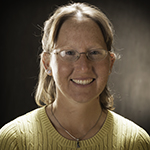
Kate Zeigler
Las Vegas, N.M. — New Mexico Highlands University geology postdoctoral fellow Kate Zeigler published an audiobook aimed at making geology accessible and telling the story of planet Earth.
The Modern Scholar published Zeigler’s audiobook, The Geology Story, of four CDs and eight lectures.
“Geology is often thought of as simply the study of rocks, but in reality geology is so much more,” Zeigler said. “It’s the study of our planet on all scales, from microscopic to planetwide. It can range in time from almost instantaneous events like earthquakes to the glacially slow motion of the tectonic plates.
“Rocks are born from many geological processes and each has a story. Rock formations influence the resources we use, like water, and the landscape we interact with, like nearby Wagon Mound, which is a volcanic lava flow,” Zeigler said.
Zeigler is an adjunct geology faculty member at Highlands. Her audiobook covers many of the topics she teaches in her introductory geology course.
“My goal is to make geology accessible and relevant,” she said.
In 2008, Zeigler completed her Ph.D. in geology from the University of New Mexico. Her dissertation focused on the paleomagnetism of the geologic formations at Ghost Ranch near Abiquiíº and north of Santa Fe.
“Paleomagnetism is the history of the earth’s magnetic fields recorded in rocks,” Zeigler said.
In 2012, an editor from Modern Scholar participated in a hike Zeigler led for youth at Ghost Ranch, where she explained geological formations like Chimney Rock and other scenic landmarks. Later, the editor contacted Zeigler about recording a geology audiobook.
Her path to Highlands began in 2011.
Early that year, Highlands University geology professor Michael Petronis secured a National Science Foundation grant for groundbreaking hydrogeological research to map the first subsurface geology of the Ogallala Aquifer, part of the Central High Plains Aquifer.
Historic declines in the Central High Plains Aquifer, one of the largest in the world, have created growing concerns about the long-term sustainability of the aquifer. It supplies 30 percent of the groundwater in the United States and is the primary groundwater source in eight states.
In August 2011, Zeigler was accepted as a postdoctoral fellow at Highlands for a three-year period funded by the NSF grant.
“When we look at water resources, it’s very much tied to geology. The more we know about our groundwater resources, the more informed communities can be when making decisions about these important resources,” Zeigler said.
Zeigler’s research is under the direction of Petronis and focuses on developing a magnetic polarity history for the Ogallala Formation to better understand when different parts of the formation were deposited. Part of her research involves analyzing sedimentary core samples from the formation.
“I wanted to come to Highlands for my postdoc research for several reasons. First, it was an opportunity to work with Mike Petronis. We focus on different aspects of paleomagnetism that are complementary. Highlands also has the only paleomagnetic lab in New Mexico and has the equipment I needed for my rock analysis. It was also a wonderful opportunity to work on a large-scale research project of the Ogallala Aquifer,” Zeigler said.
Highlands University’s ongoing research on the aquifer is shedding new light on how it functions.
“We’re learning that the Ogallala Aquifer is not one homogeneous system and instead is made up of different ages of rocks that are compartmentalized. This results in small divided aquifers rather than one big ocean of water,” Zeigler said.
Zeigler established Zeigler Geologic Consulting (ZGC) in 2009 and provides geologic services to clients in New Mexico, Arizona and Utah. One ongoing ZGC initiative in New Mexico is the Union County Hydrogeology Project funded by the Northeast Soil and Water Conservation District.
